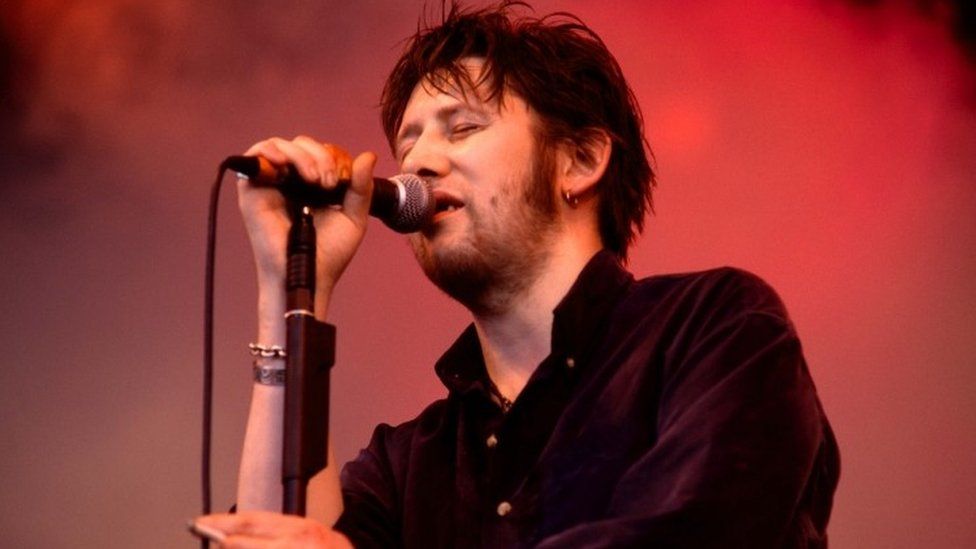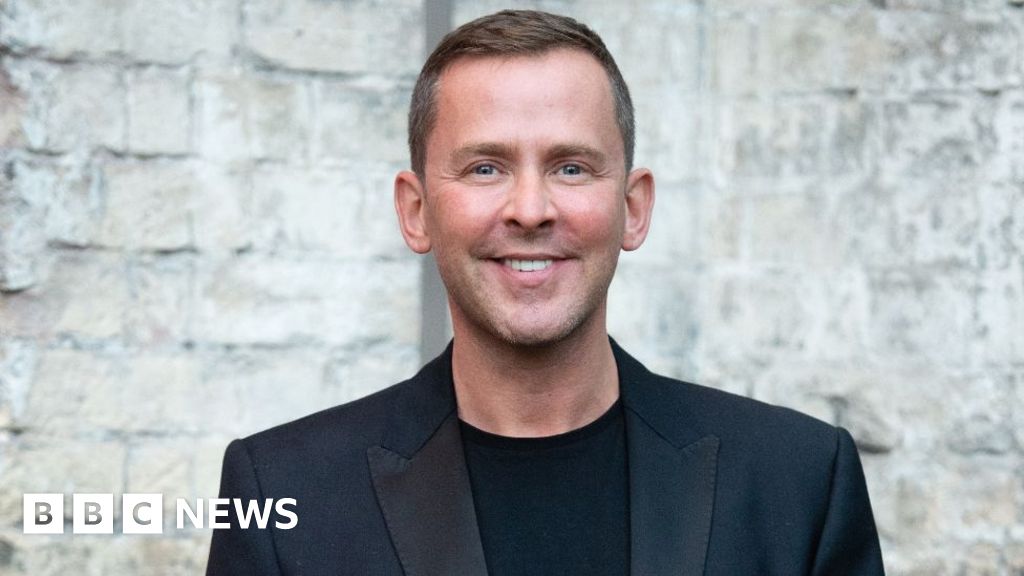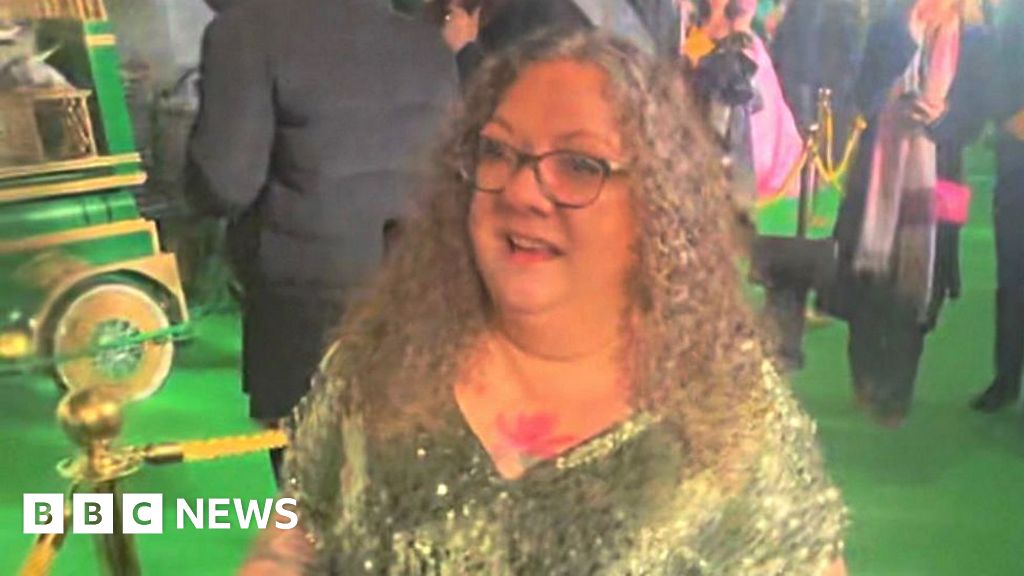ARTICLE AD BOX
 Image source, Getty Images
Image source, Getty Images
The Pogues were once described as a tight, professional bunch of musicians fronted by a total shambles.
But the shambles, their charismatic singer Shane MacGowan, was heralded as one of the finest song writers and lyricists of his time.
The Pogues' great achievement was to successfully bring together traditional foot-stomping Irish music with the crashing chords of North London punk.
Like fellow Celts Brendan Behan and Dylan Thomas, MacGowan's source of inspiration was invariably alcoholic and he became as famous for his legendary excesses as he was for his music.
Shane Patrick MacGowan was born in Kent on 25 December 1957 while his Irish parents were visiting relatives. He spent the first six years of his childhood in a rural idyll in Tipperary before his family moved to live in England.
He lived much of his life expressing the musical sentiments of an Irishman in exile, though he later made Ireland his home.
MacGowan's mother was a prize-winning traditional Irish singer; his father an aspiring writer. When he was 12, Shane won a scholarship to the prestigious Westminster public school.
Image source, Getty Images
Image caption,He had a spell as a journalist editing a fanzine
He didn't fit in and was expelled at 16 after being caught with drugs. He began working in London record shops and bars to satisfy his love for music and drink.
MacGowan was inevitably drawn to the energy and chaos of the punk movement. He first made the news when he was photographed covered in blood from a bitten ear while at a concert by the band The Clash.
The picture subsequently made the newspapers under the somewhat overstated headline, "Cannibalism at Clash Gig."
For a time he became a journalist, editing a Punk fanzine.
Irish experience
In 1977 he joined the Nipple Erectors, later shortened to The Nips, a band that had been formed in North London by Shanne Bradley.
Then known as Shane O'Hooligan, MacGowan became the front man and chief songwriter for the band which released four singles before splitting up.
It was not until he formed Pogue Mahone ("Kiss My Arse" in Gaelic), that he was finally able to mix the rawness of punk with the Irish poetry and sentimentality of his lyrics to huge critical and commercial acclaim.
Image source, Getty Images
Image caption,The Pogues were a band of considerable musical ability
MacGowan's songs, often with strong Irish republican influences, reflected the experience of the Irish diaspora whether in North London or further afield.
He has often cited Brendan Behan as a major influence, a man who, like McGowan himself, was a talented writer who was partial to the bottle.
Billy Bragg commented that "they came at folk music, got hold of it by the lapels, and threw it down the stairs".
Between 1984 and 1990, the band, its name diplomatically shortened to The Pogues, released five albums, with songs such as A Pair of Brown Eyes and A Rainy Night in Soho hailed as classics.
Poetry
The Pogues appeared as special guests on tours by U2, culminating in a date at Madison Square Garden in New York.
In 1988, Kirsty MacColl collaborated with the Pogues for the MacGowan-penned Fairytale of New York which made number two in the UK charts and has become an evergreen Christmas favourite.
While MacColl appeared in the promotional video for the song, she and McGowan recorded their individual tracks quite separately.
Image source, Getty Images
Image caption,His duet with Kirsty MacColl was one of the great Christmas songs
The song helped The Pogues' next album, If I Should Fall from Grace with God, sell more than a million copies worldwide.
Fabers published a volume of his poetry entitled Poguetry, and MacGowan became the leading musical spokesman for the London Irish community.
Although he was later praised for revitalising pub and rebel songs with his punk arrangements, these songs were initially greeted less favourably by some in the native Irish community who accused him of bringing their music into disrepute and perpetuating the myth of the "drunken paddy".
In fact, the line between MacGowan's own lifestyle and the down and outs he sang about had become increasingly blurred and by 1991, the Pogues were moved to throw out their founder member because of his increasingly erratic behaviour.
Revival
One of his friends, the singer Sinead O'Connor, once called in the police when she saw him taking heroin. It cured him of the habit. But MacGowan continued to defy doctors' warnings about his alcohol intake.
MacGowan went on to form a new band The Popes, and in 1994, the album The Snake was released to fresh acclaim.
Three years later came Crock of Gold, with its album cover featuring a painting by Shane MacGowan of leprechauns that resembled the demons that seemed to haunt him throughout his life.
Image source, PA
Image caption,Advice to curtail his drinking was usually ignored
He rejoined the Pogues in 2001 signalling a revival of the band which, over the following years, played to dozens of sell out audiences in the UK, Ireland and the USA.
Their packed Christmas gigs became a joyous festive tradition, the Guinness-fuelled crowd singing along with every number, as an increasingly inebriated McGowan hung desperately on to the microphone stand.
In 2005, the re-released Fairy Tale of New York, reached number two in the UK charts as part of a fundraising drive in support of the charity Crisis at Christmas.
Five years later he began performing with a new line-up, The Shane Gang, which featured members from the Irish rock band, In Tua Nua.
A television documentary, screened in 2015, focused on MacGowan's decision to have a new set of teeth, the last of his natural ones having given up the ghost seven years previously. The Guardian referred to the nine-hour procedure as 'the Everest of dentistry'.
Honoured and married
A bout of pneumonia, combined with a hip injury - initially sustained following a fall as he was leaving a Dublin studio in 2015, fracturing his pelvis - left MacGowan requiring a long and enforcedly sober stay in hospital, the following year.
By now using a wheelchair, he turned 60 in 2018. To mark the occasion he was honoured with a concert gala - attended by the likes of fellow rock stars Nick Cave and Bobby Gillespie - at the National Concert Hall in Dublin, where he was presented the Lifetime Achievement Award by Irish President Michael D Higgins.
It proved to be a big year for the singer, as after an 11-year engagement, he also married Irish journalist Victoria Mary Clarke in a ceremony in Copenhagen.
Image source, Crock Of Gold
Image caption,His band are known for songs including A Rainy Night In Soho
In 2020, BBC Radio 1 said it would not play the original version of Fairytale of New York that Christmas, because its audience may be offended by the song's use of a term now widely considered a homophobic slur, sparking debate.
Around the same time, a late decision was made to subtitle the star's voice for the UK release of a documentary about his life - director Julien Temple's Crock Of Gold: A Few Rounds With Shane MacGowan - after some said it was hard to make out what he was saying.
MacGowan was one of popular music's great survivors whose excesses did not seem to dim his creative talent.
He once boasted that most of his 300 songs had been penned while under the influence. "I haven't," he famously said "joined a band to drink milk."
In November 2023, his wife had been posting updates on his health after he was hospitalised, including regular photographs of him in his hospital bed.
This Twitter post cannot be displayed in your browser. Please enable Javascript or try a different browser.View original content on Twitter
The BBC is not responsible for the content of external sites.
On 23 November, she wrote: "Shane got out of the hospital! We are deeply and eternally grateful to all of the doctors and nurses and staff at St Vincent's it's the best!".
She included a photograph of the singer looking frail, wearing a hat and scarf in bed, and when his death was announced, she said: "I am blessed beyond words to have met him and to have loved him and to have been so endlessly and unconditionally loved by him and to have had so many years of life and love and joy and fun and laughter and so many adventures.
"There's no way to describe the loss that I am feeling and the longing for just one more of his smiles that lit up my world."
Related Internet Links
The BBC is not responsible for the content of external sites.

 1 year ago
24
1 year ago
24








 English (US) ·
English (US) ·